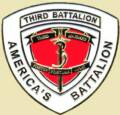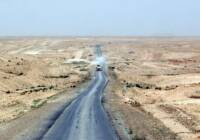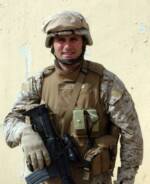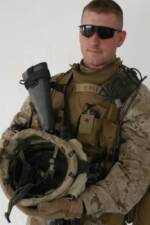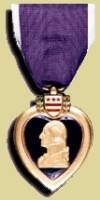

Note: This is not an official website. It's purpose is to support Marines of 3/3.
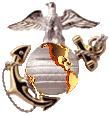
WELCOME HOME 3/3
And
Thank YOU!
The following is from a blog by Roger Leo at: http://menatwar.blogspot.com/
Friday, November 10, 2006
"Wild, Wild West"
ANBAR (MAY 2006) – Roger Leo
Anbar Province, called “the wild, wild west” by the U.S. commander on the ground there, is enormous, remote, dangerous and seemingly ignored to a degree by the Iraqi government in Baghdad.
Daily foot and motor patrols take Marines of Kilo Co., 3-3, out of their firm base – a fortified compound in the middle of Haqliniyah – into city streets and surrounding villages.
Each foray brings danger of attack, most dangerously from roadside bombs which so far have accounted for all but two of 3-3 Marines 12 deaths since arriving in Iraq in February.
Pitched battles always end in favor of American troops, but they are few and far between in most parts of Anbar, where the remotely detonated bombs are a daily occurrence, and take a toll on men and morale.
One facet of this war is the repeated deployment of the same troops, sometimes to Iraq, sometimes between Iraq and Afghanistan, with some time in the United States between deployments to train and refit.
Many of the Marines now in “the Triad” – an area of Iraq along the Euphrates River northwest of Baghdad – with 3-3 also were in Afghanistan last year. They were deployed there for seven months, returned to their base in Hawaii in June 2005, then deployed to Iraq in February.
Dangerous Duty
ANBAR (MAY 2006) – Roger Leo
“High-intensity combat? No. But we’re most often fighting at a time and place of their choosing,” Lt. Col. Cooling said.
“The history of this area is problematic. All Anbar is a Sunni area of Iraq. Saddam Hussein’s government was their government. Many did not like him and many suffered, but the great fear sometimes is to be dominated by one of the other groups – Shia, Kurd, etc. in the government.
“In part this stems from being deathly afraid of Iran, which is Shia,” he said.
“There’s a real debate at home about whether we should have invaded Iraq three years ago. That’s counterproductive. The debate should be about what we do here now,” Lt. Col. Cooling said.
“Americans should be concerned about this area of Iraq providing al Qaeda the kind of training ground that led to 9-11, and part of Iraq breaking off and allying with the Shia theocracy in Iran.
“I really believe we should be here. I’m asking these Marines to potentially pay for these beliefs with their lives and I’m the one who has to call their Moms if something happens to them,” he said.
In Afghanistan, 3-3 Marines lost two men in one of 22 firefights during the unit’s deployment there. So far in Iraq, 12 men have been killed – nine by bombs, one by sniper fire, and two in non-battle incidents.
Kilo Co. – one of four companies that make up 3-3 – is in Haqliniyah, a city about 15 kilometers south of Haditha Dam, a flood control dam built by Czech engineers on the Euphrates in 1981. Marines conduct daily foot and mounted patrols in the city and environs, and each day are hit by IEDs.
Rarely, the Marines come under direct enemy fire, which they say they greatly prefer to the gnawing impact of bombs detonated remotely by faceless enemies.
In one of these instances, a foot patrol led by Sgt. Gayle L. Anders, 23, of New Braunsfels, Texas, spotted men carrying 155mm shells and Ak47s into a derelict building that had once been a hotel on the southern edge of Haqliniyah. As the patrol moved in, the Marines started taking small arms fire from several points in the building. They returned fire, set up a cordon around the building, and called for fire support. As the day progressed, more Marines from Kilo Co. arrived and began firing into the building. Attack helicopters and fixed-wing planes arrived and dropped an array of weapons onto the building. The south wing was leveled. One bomb went astray when it failed to acquire the airborne laser designator and hit a building – about 100 yards north of the former hotel – in which 13 Marines and eight Iraqis were sheltering.
Lucky Marine
HAQLINIYAH (MAY 2006) – Roger Leo
“One child has a laceration above the right eye, turned out it was nothing a couple of band-aids couldn’t fix, but we called for a Priority 1 medevac.
“I didn’t know if everyone was all right. It took about 30 seconds to figure it out then another few seconds to get on the radio.
“It was an accident. Noone was seriously hurt. The Marines didn’t let the bomb make them lose focus on the mission. It was a good learning experience,” Lt. Burke said.
That ended the day’s aerial bombardment. Next day, it resumed and over the course of the following week the derelict building was leveled.
Maj. James F. Kendall, 37, of Nashua, N.H., fire support coordinator, said that between May 11, when Sgt. Anders’ patrol was attacked, and May 18, when the former hotel was leveled, at least 16 aerial weapons were dropped.
These included seven 500-pound bombs, five hellfire missiles, two TOW missiles and two 2,000-pound bombs, some guided by laser beams, others by programmed coordinates, others through thin wires.
“We were able to come up with a weaponry solution to drop the building without collateral damage and without endangering Marines,” Maj. Kendall said.
“The hotel has been a problem for a long time. It was a known insurgent location, and having bad guys in the building was a good opportunity for us. PsyOps (psychological operations) did make surrender appeals, but they were ignored. Battalion urged the mayor to talk with the insurgents, to surrender. He couldn’t go near the place, it was rigged to blow up,” Maj. Kendall said.
Lt. John C. Burke, 25, born in Foxboro, living in Boston, commander of the 3rd Platoon, Kilo Co., 3-3 Marines, was in the house when the bomb hit.
Looking at a video shot from a small digital camera, Burke described the blast: “This is the rooftop we’re on. See all the shell casings? Then ‘Blam,’ blackness. There were 13 Marines there. Myself and three others were on the roof, six were inside and three on the outside, and at least eight Iraqis.
“It was three sensations all at once: I heard the noise, felt the overpressure , saw basically darkness.
A visit in May to Iraq’s Anbar Province, to the area assigned to the 3rd Battalion, 3rd Regiment, 3rd Marine Division – “America’s Battalion” – found very different conditions than encountered on trips to Baghdad in September of 2004 and February of 2005.
Conditions also were very different from those found on a visit to 3-3 Marines in Afghanistan a year ago.
Lt. Col. Norman L. Cooling, 41, commander of 3-3 Marines, said, “In Afghanistan we weren’t particularly safe anywhere, but we knew we would be contested if we went certain places. We planned for that.
“Here these areas are everywhere. Simultaneously an urban patrol can be hit with small arms fire or IEDs or both and at one of firm bases we can be taking indirect fire – mortars or rockets.
Click PH to view ceremony
